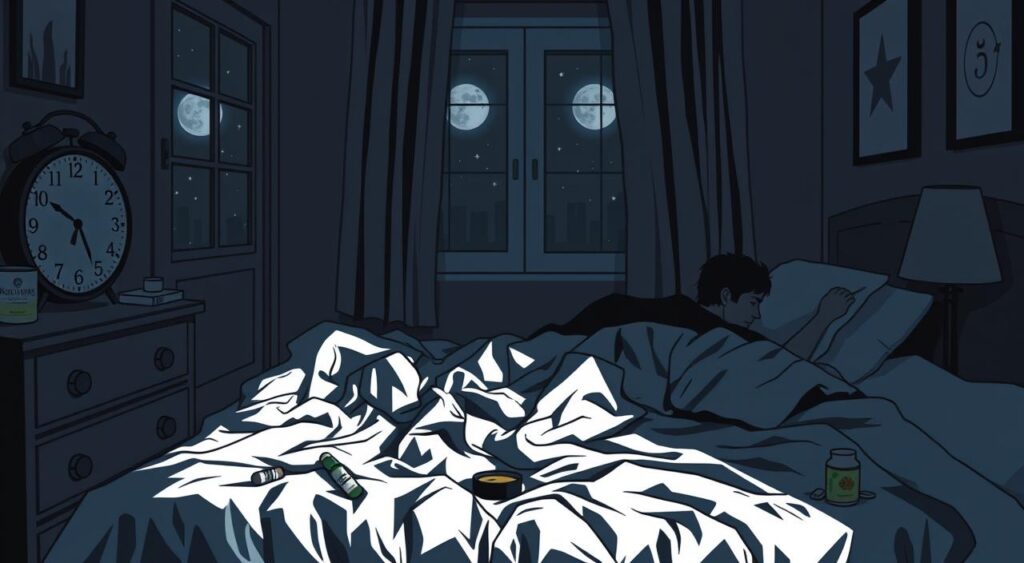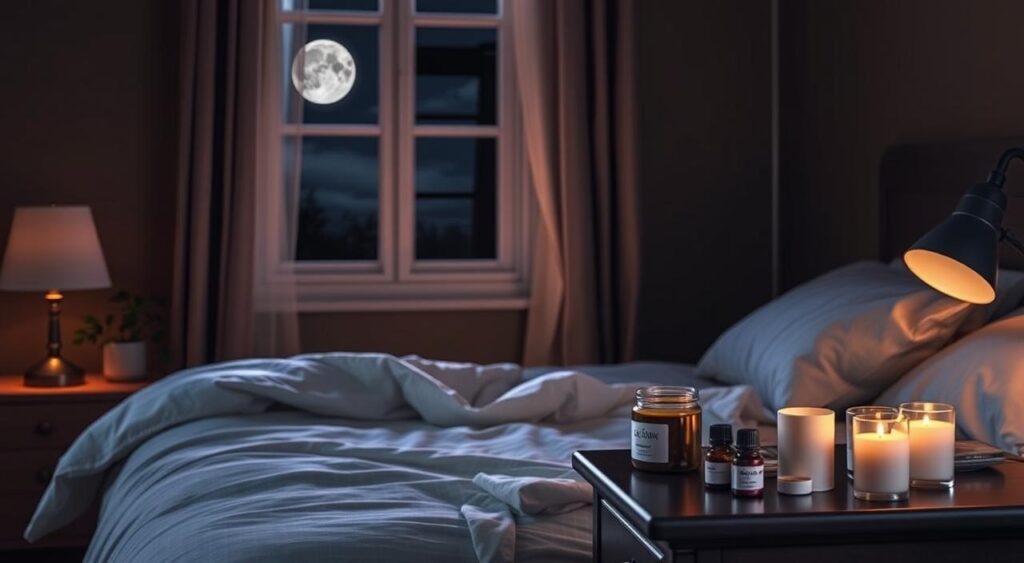Discover the root causes, signs, and holistic solutions for insomnia disorder to improve your sleep quality.
A staggering 30% of people face insomnia disorder, a common sleep issue. It makes daily life hard, especially when it’s hard to sleep. This condition affects millions, causing distress and problems in daily life.
It’s important to know what causes and symptoms of insomnia disorder are. This knowledge helps find good treatments and natural remedies. It’s key to understanding this sleep disorder.
Insomnia disorder can harm a person’s mood, thinking, and health. It can even lead to chronic diseases. So, it’s vital to tackle trouble sleeping. Luckily, there are many natural ways and treatments to help manage insomnia disorder.
By learning about insomnia disorder, people can start to control their sleep. They can take steps to beat this common sleep problem. This can lead to better sleep quality and less trouble sleeping.

Dealing with insomnia disorder needs a full treatment plan. This includes changing lifestyle habits, managing stress, and sometimes seeking professional help. These steps can help ease trouble sleeping.
By knowing about insomnia disorder and its treatments, people can make smart choices for their sleep. They can take action to overcome this sleep disorder and reduce trouble sleeping.
Key Takeaways
- Insomnia disorder affects a significant portion of the population, causing trouble sleeping and impacting daily life.
- Understanding the causes and symptoms of insomnia disorder is crucial in finding effective treatments and natural remedies for this sleep disorder.
- Natural remedies and lifestyle modifications can help manage insomnia disorder and improve sleep quality, reducing trouble sleeping.
- Professional help is available for individuals struggling with insomnia disorder, including sleep studies and evaluations.
- By taking a comprehensive approach to treatment, individuals can regain control of their sleep health and overcome insomnia disorder, ultimately reducing trouble sleeping.
- Education and awareness are key in managing insomnia disorder and improving overall well-being, which can help alleviate trouble sleeping.
Understanding Insomnia Disorder
Insomnia disorder affects millions globally, causing a lot of distress. It’s important to know the different types to treat it well. Acute insomnia is short-term, often from stress or changes in sleep place. Chronic insomnia lasts long and can come from many factors.
People with insomnia might find it hard to fall or stay asleep. This can mess up work, relationships, and health. Research links insomnia to mental health issues like depression and anxiety. It can also make other health problems worse.
Some think insomnia is just in the mind or can be fixed with sleep aids. But it’s more complex. It needs a full treatment plan, including lifestyle changes, therapy, and sometimes medicine. Knowing about insomnia helps in finding the right treatment and better sleep.
- Insomnia affects about 10% of adults worldwide.
- Women are more likely to have insomnia than men.
- Insomnia can raise the risk of diseases like diabetes and heart disease.
Recognizing insomnia signs and getting help is the first step. It can lead to better sleep and a better life.
The Science Behind Sleep Disturbances
Understanding sleep disturbances is key to solving sleep problems. The body’s sleep cycle, or circadian rhythm, is controlled by the brain, hormones, and outside factors. Sleeplessness happens when this system gets out of balance, causing sleep issues.
Many things can lead to sleep problems, including:
- Neurotransmitters: Chemicals in the brain that control sleep and wakefulness
- Hormones: Like melatonin, which helps us sleep
- External factors: Light, noise, and temperature can also affect sleep quality
Studies show that sleep issues can really impact our daily lives. They can make us tired, less productive, and raise the risk of serious diseases.
To tackle sleep problems, we need to understand their science. We can start by setting a regular sleep schedule, making our sleep space comfy, and avoiding exciting activities before bed.
Fixing sleep disturbances needs a full approach. It must consider how our body’s systems and outside factors work together.
Primary Causes of Insomnia Disorder
Insomnia disorder is a complex condition with many underlying factors. It can be triggered by psychological, physical, environmental, and lifestyle factors. Knowing these causes is key to finding effective treatments.
Key factors include stress, anxiety, and depression. These can mess up sleep patterns, making it hard to fall or stay asleep. Physical health issues like chronic pain and sleep apnea also cause insomnia.
Environmental factors, like noise and light, can disrupt sleep. Lifestyle choices, such as caffeine and nicotine, can make insomnia worse. Here are some common causes:
- Psychological factors: stress, anxiety, depression
- Physical health conditions: chronic pain, sleep apnea
- Environmental influences: noise, light exposure
- Lifestyle contributors: caffeine, nicotine use
It’s important to address these factors to manage chronic insomnia. Understanding the causes helps individuals start effective treatment plans. This can greatly improve their sleep and overall quality of life.
Recognizing Insomnia Symptoms
Insomnia symptoms vary from person to person. It’s key to know the common signs of this sleep disorder. People with insomnia often have trouble falling asleep, wake up during the night, or wake up too early.
These sleep issues can really affect daily life. They can change mood, energy, and overall health.
Some common symptoms include lying awake for hours, feeling tired in the morning, and having trouble concentrating. Difficulty falling asleep is common, where people can’t relax and fall asleep. Others wake up in the middle of the night and can’t go back to sleep.
It’s important to know these symptoms and when to get help. If sleep problems keep you up at night and affect your day, see a doctor. They can help figure out what’s wrong and offer advice.

Knowing about insomnia symptoms is crucial for managing and treating it. By recognizing the signs, people can take steps to improve their sleep. This leads to better rest and a healthier life.
Diagnosis and Professional Assessment
Diagnosing insomnia disorder needs a detailed approach. This includes sleep studies and evaluations. Healthcare experts use different methods to find out why someone has insomnia. It’s key for treating it well.
They start by looking at the person’s medical history. This helps find out what might be causing the sleep problem.
Some common ways to diagnose insomnia are:
- Sleep diaries or logs to track sleep patterns
- Actigraphy, which involves wearing a device to monitor sleep-wake cycles
- Polysomnography, a sleep study that records brain waves, heart rate, and other physiological activities during sleep
If insomnia symptoms don’t go away, it’s important to get professional help. A doctor can figure out the best treatment plan. Early treatment can greatly improve someone’s life, helping them manage their insomnia better.
Getting professional help can help understand and manage insomnia. This might include changing lifestyle habits, trying behavioral therapies, or using medication. With the right plan, people can beat insomnia and sleep better.
| Diagnosis Method | Description |
|---|---|
| Sleep Diaries | Tracking sleep patterns to identify insomnia symptoms |
| Actigraphy | Monitoring sleep-wake cycles using a wearable device |
| Polysomnography | Recording brain waves, heart rate, and other physiological activities during sleep |
Natural Remedies and Holistic Approaches
For those with insomnia disorder, finding good solutions is key. Natural remedies and holistic methods can help a lot. They can ease trouble sleeping and boost overall health.
Some natural remedies for insomnia include:
- Mindfulness and relaxation techniques, such as meditation and deep breathing
- Dietary changes, like avoiding caffeine and heavy meals before bed
- Keeping a regular sleep schedule and making a sleep-friendly environment
These methods can help manage insomnia symptoms and improve sleep quality. By adding natural remedies and holistic approaches to their treatment, people can actively manage their trouble sleeping. This helps promote their health and well-being.
It’s important to talk to a healthcare professional before trying new treatments for insomnia disorder. Working with a doctor, people can create a detailed treatment plan. This plan will include natural remedies and holistic methods to tackle symptoms and enhance sleep health.
Lifestyle Modifications for Better Sleep
Many people have trouble sleeping and find it hard to stay asleep. But, making a few simple changes can help. One key way is to stick to a regular sleep schedule and make your bedroom sleep-friendly.
Try going to bed and waking up at the same time every day, even on weekends. A calming bedtime routine, like reading or a warm bath, can also help. A dark, quiet, and cool room is best for sleep.
Sleep Hygiene Practices
Good sleep hygiene is crucial. Avoid caffeine, nicotine, and screens before bed. Eating well and exercising regularly can also help you sleep better.
Diet and Exercise Impact
Eating foods like cherries and walnuts, which have melatonin, can help you sleep. Yoga or walking can also improve sleep. But, avoid intense exercise close to bedtime.
Stress Management Techniques
Stress can hurt your sleep. Try meditation or deep breathing to relax. Use apps or just take a few minutes each day to breathe deeply.
By adding these changes to your daily life, you can sleep better. Remember, it might take time to see the difference. Be patient and keep at it.
| Lifestyle Modification | Benefits for Sleep |
|---|---|
| Consistent sleep schedule | Regulates body’s internal clock |
| Sleep-conducive environment | Promotes relaxation and reduces sleeplessness |
| Healthy diet and exercise | Helps regulate sleep and reduces sleep problems |
| Stress management techniques | Reduces stress and promotes relaxation |
Medical Treatment Options
For those dealing with insomnia, there are many medical treatments available. These treatments aim to improve sleep quality. They often combine prescription drugs and cognitive-behavioral therapy for insomnia (CBT-I).
Prescription drugs, like sedatives, help you fall and stay asleep. CBT-I, on the other hand, tackles thoughts and behaviors that affect sleep.
Some common treatments for insomnia include:
- Cognitive-behavioral therapy for insomnia (CBT-I)
- Prescription sleep aids, such as benzodiazepines and non-benzodiazepines
- Melatonin receptor agonists
It’s crucial to talk to a healthcare professional about the best treatment. They can create a plan that fits your needs and health. Combining medical treatments with lifestyle changes and stress management can help manage insomnia.

Exploring these options and working with a healthcare professional is a big step. It can help you overcome insomnia and enjoy a peaceful night’s sleep.
Conclusion: Taking Control of Your Sleep Health
Insomnia disorder can really affect our well-being. But, by knowing the causes and solutions, you can improve your sleep. Whether it’s chronic insomnia or occasional sleep issues, being proactive is key.
Start by making lifestyle changes for better sleep. This includes a regular sleep schedule, a comfy sleep space, and stress relief. Look into natural remedies and holistic methods to help you sleep better. If insomnia doesn’t go away, get help from sleep specialists who can offer tailored advice and treatments.
Putting sleep first is a big step for your health. By tackling your insomnia, you can get quality sleep. This improves your physical, mental, and emotional health greatly.
FAQ
Q: What is insomnia disorder?
A: Insomnia disorder makes it hard to fall asleep, stay asleep, or wake up too early. It can really affect your daily life and how you feel overall.
Q: What are the different types of insomnia?
A: There are a few main types of insomnia. – Acute insomnia is short-term and often caused by stress or big life changes. – Chronic insomnia lasts a long time, at least 3 nights a week for 3 months or more.
Q: How does insomnia affect daily life?
A: Insomnia can really mess with your daily life. It can make you less productive and focused at work or school. It also increases the risk of accidents and injuries.
It can make your thinking and decision-making skills worse. It can also strain your relationships and make you feel less happy overall.
Q: What are some common misconceptions about insomnia?
A: Some people think insomnia is just a normal part of getting older. They might think sleeping pills are the best way to fix it. Or they might think it’s caused by one thing.
But, insomnia is not just about getting older. It’s not solved by sleeping pills alone. And it’s not because of one thing or because you’re weak.
Q: What are the primary causes of insomnia disorder?
A: Insomnia can come from many things. It can be caused by stress, anxiety, or depression. It can also be caused by physical health problems like chronic pain or asthma.
Things like noise, light, and temperature can also play a part. So can lifestyle choices like drinking too much caffeine or using screens too late at night.
Q: What are the common symptoms of insomnia disorder?
A: The main symptoms of insomnia include trouble falling asleep. You might wake up a lot during the night. Or you might wake up too early and can’t fall back asleep.
It can also make you feel tired, irritable, and have trouble concentrating during the day.
Q: When should someone seek professional help for insomnia?
A: You should see a professional if insomnia lasts more than 3 months. If it’s really affecting your daily life, you should get help. If you’ve tried to manage it on your own without success, it’s time to seek help.
If you think a medical condition might be causing your insomnia, you should also get professional help.
Q: What natural remedies and holistic approaches can help manage insomnia?
A: There are many natural ways to help with insomnia. Relaxation techniques like meditation, deep breathing, and yoga can help. So can improving your sleep habits and creating a sleep-friendly environment.
Using calming herbs, supplements, and essential oils can also help. Regular exercise and a balanced diet are important too.
Q: What medical treatment options are available for insomnia disorder?
A: Doctors can prescribe sleep medications for short-term use. Cognitive-behavioral therapy for insomnia (CBT-I) can also help. It focuses on the psychological factors behind insomnia.
For more severe cases, a combination of medication and CBT-I might be recommended.
